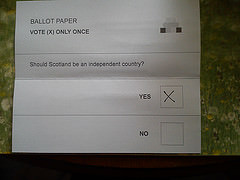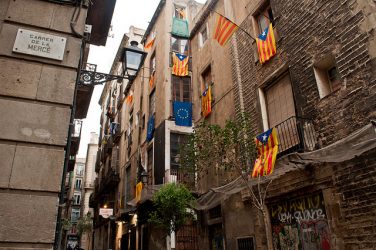The rise of independence movement across Europe is worrying for the status quo. E&M explains what they mean for the future of the continent.
On the morning of 19 September, one thing was clear for the defeated Scottish First Minister Alex Salmond: the Scottish people had participated in a vote with the highest turnout of any referendum in history. With 84% of the Scottish population headed to the polls, the Scottish people can be proud of an impressive record for British democracy despite the negative outcome for the 48% who had wanted independence. For the rest of the world, however, it is only an indication of how close the mighty decision came to making fundamental changes to not only to the United Kingdom, but also to Europe. It would have signaled to the world that there is nothing united about the “United Kingdom” – and that they would exist in the world on their own terms.

The fact that David Cameron, in a frenzied last-minute promised to honour the Scottish parliament with more power and autonomy (not excluding Wales and Northern Ireland), illustrated that Scottish independence and the break-up of the union wasn’t only fantasy of nationalists, but a possible reality. Naturally these actions didn’t go unnoticed in London’s House of Parliament. No other than UKIP’s ardent leader Nigel Farage was quick to point out Cameron’s weak and improvised concessions to the Scottish without thinking about “what is good for England.” Sadly, nationalism doesn’t stop at the Scottish border.
The effect of the Scottish vote on the financial markets shouldn’t be understated.
It wasn’t only those in the political realm who expressed their concern over the Scottish vote: its effects on the financial markets shouldn’t be understated. According to the FT, a week before the election, markets witnessed an outflow of £1bn from UK equity funds. Scotland based financial groups were even considering moving south of the border in the case of a break-up. The fear runs deeper, if you consider that the precendent that the Scottish vote could have set for a referendum on British EU membership. “Brexit” is next, professionals in business and finance seem to believe. Yet, what the market signal is that Britain has a lot to lose if it decides to leave the EU. It might be separated from the continent by the channel, but in economic terms, there are few barriers. The British are much more dependent on EU membership than they think, and Scottish independence could have instilled an even greater sense of retrenchment in the run up to the expected referndum in 2017.

One cannot ignore, however, that to the EU, the Scottish vote instilled the feeling of having dodged a bullet. That bullet would have generated repercussions in one other country in particular: Spain. The relief was clearly visible on Spanish Prime Minister Rajoy’s face. For him, the coming weeks are decisive: not only does he need to heed supporting the status quo, but also make the case why Catalonia would be better off remaining a part of Spain.
Speaking with young Catalonians today, you notice that they never describe themselves as Spanish.
Speaking with young Catalonians today, you notice that they never describe themselves as Spanish. Just look at their loyalty to the football clubs over the national team. It is not unheard of that FC Barcelona fans could and would support the Spain’s national football team. Simply put, the struggle to identify with the nation Spain, permeates at all levels.
For the Catalan President Arthus Mas, Scottish independence is a big blow to the movement for autonomy in his region, despite having just signed a decree for a referendum on 9th November 2014. The questions that one can easily ask are: Why now? Is the bad economy to blame for this? Is this a necessary step for Spain to become a democratically sound country, three decades after Franco’s dictatorship? Maybe a mixture of all these things. Yet, there is a way to stay in one country and have autonomous decisions over finances and politics.
If Spain would embrace a federal structure, a recent commentary in the Spanish daily newspaper “El país” declared, there would be no need for separatist movements. It would circumvent a complete breakdown of Spain as one country and one nation built together, as the journalist proclaims. As the memory of the Scottish referendum fades and the new Commission President Jean Claude Juncker takes office, an avid supporter of a federalist Europe, the European Union is set to have a makeover with increasing pressure from independence movements for their parts of the world to break out as new nation states.
Cover Photo: Nell Winton, CC BY-NC-ND 2.0 (flickr)







